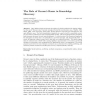66 search results - page 2 / 14 » Explicit Evidence Systems with Common Knowledge |
HICSS
2008
IEEE
13 years 11 months ago
2008
IEEE
– This study examines the processes of organizational knowledge creation in two highly virtualized teams, one involved in the design of a small city car and the second in the re-...
ICTAI
1997
IEEE
13 years 8 months ago
1997
IEEE
Knowledge refinement tools have commonly been applied to diagnostic applications. This paper considers the refinement of a design application. It explores the differences in knowl...
HICSS
2005
IEEE
13 years 11 months ago
2005
IEEE
Research in face-to-face communication has identified a variety of largely unconscious patterns of behavior that are used by collaborators to coordinate their conversation, build ...
DATAMINE
1999
13 years 5 months ago
1999
Many KDD systems incorporate an implicit or explicit preference for simpler models, but this use of "Occam's razor" has been strongly criticized by several authors (...
NSPW
2004
ACM
13 years 10 months ago
2004
ACM
We argue in favor of the explicit inclusion of suspicion as a concrete concept to be used in the analysis of audit data in order to guide the search for evidence of misuse. Our ap...


